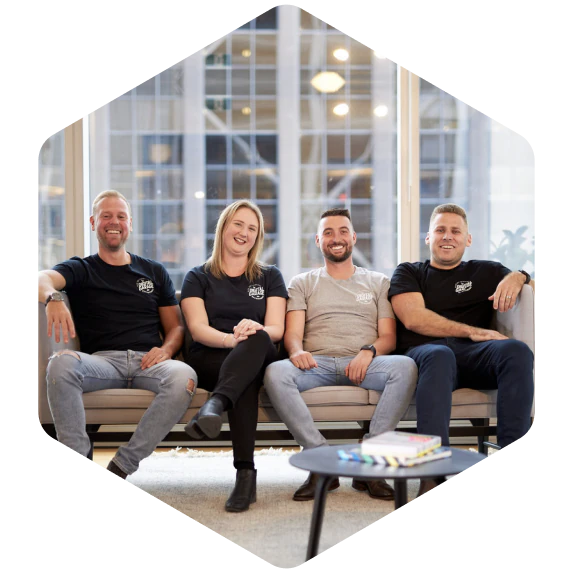How to Build High-Performing Tech Teams in 2025: What Engineering Leaders Need to Know

Hiring skilled and engaged people for your team is a mission and a half. (That's why Digital Garage exists.) But the mission doesn't end with recruitment. Once you've hired a promising developer, product guru or data maven, you need strategies to get the best out of them and make them happy enough to stay as long as possible. Always easier said than done!
Your best hires can still crash and burn if the right support structures are missing, the workplace culture is poor, or the business vision is muddy. As the adage goes, retention is easier than recruitment - so here are actionable tips for building and keeping an A-team that others might (hopefully) envy.
First, a Golden Rule of Tech Recruitment
It's tempting to hunt for that elusive unicorn, the perfect candidate who ticks every technical box. But unless you're secretly breeding software engineers in a lab, there are better ways to identify a candidate's long-term value in your team - and that's with skills-based hiring.
In a nutshell: Focus on core competencies, the foundational skills that underpin your tech stack, and the candidate's ability to learn. These factors are foundational to skills-based hiring, which is becoming increasingly popular among New Zealand employers for good reasons.
The best hires are more than experts in the niche skill you need today. They will also be inquisitive and adaptable enough to tackle the tech of tomorrow. When hiring, look for candidates who show a hunger to learn new things and test themselves. This might come through in the way they've tackled a challenge in a previous role, or the side projects and hobbies they've engaged in.
A sharp developer who can pick up new frameworks quickly will outshine a rigid specialist when your stack inevitably evolves. And in this era of AI-led coding and AI-everything-else, learning agility and critical thinking are commodities that will only increase in value.
Promote an Always-Learning Culture
Stagnation is a bug, not a feature. Today's must-have tool is tomorrow's legacy system. The best teams consist of people who are hungry to learn. A learning culture makes your team adaptable, resilient, and engaged.
When you've hired people who demonstrate curiosity and the ability to embrace new concepts, you must create the environment that allows those attributes to shine. Building a learning culture means encouraging team members to get out there and learn from their peers. Support their conference attendance, fund online courses, encourage hack days - activities that get the juices flowing.
Mix Junior and Senior Talent
Experience and enthusiasm are a power combination when managing a dev team or any other kind of technical team. A squad of senior engineers might sound great, until you realise they're all set in their ways and no one wants to touch the documentation. Meanwhile, having a team of juniors keen to do the work but lacking guidance is a recipe for chaos. The key is balance.
Why not combine the best of both? All generations can learn from each other at work, and when this synergy is managed well (with zero tolerance for stereotyping), the results can be magic. Plus, nothing keeps a senior dev on their toes like having to explain their code to a keen junior.
Make Roles and Career Paths Crystal Clear
Nobody likes working in the dark. Every team member needs clarity on their role, the organisation's expectations, and future growth potential.
Let ambiguity reign and it will breed frustration or boredom. Before you know it, unhappy employees will start being more active on LinkedIn, and then a domino effect of resignations may kick off.
Clearly define roles, establish expectations, and map out career progression paths for your team members. Show them where they can grow within your organisation, and they'll be far more likely to stick around for the journey.
This is also where your employee value proposition (EVP) matters. A strong EVP gives people more reasons to stay beyond the job title. That means competitive salaries, access to equity through an ESOP, and real flexibility.
While the business is transitioning back to three days in the office, we know great people can still deliver outcomes remotely. Work-from-anywhere options remain part of the mix where the role allows. It's about trusting people to get the work done, not tracking where they sit while doing it.
Beyond flexibility, your EVP should also reflect what people value most: support for their wellbeing, opportunities to grow, and a culture built on trust. When people feel looked after, challenged in the right ways, and clear on where they're headed, retention becomes a whole lot easier.
In Summary: Build, Don't Just Hire
Effective tech recruitment is just the start. Managing a dev team or building technical teams that perform above average requires some nurturing. Focus on potential and learning agility, mix experience levels, and provide clear career paths. Follow these principles, and you can grow a team that innovates, evolves, and stays ahead of the game. That's where things get interesting. If you need expert help assembling a high-performing team of devs, product pros, or data specialists, Digital Garage can provide you with solutions forged in New Zealand's tech market. Give us a call or send us a message today.

We'd love to connect!
When you need the best digital talent in NZ, whether for urgent temporary support or a long term strategic value, we have the expertise to help. Our depth of experience as digital recruitment specialists combined with a range of proactive and innovative sourcing solutions means that the people you want are already talking to us.